https://thegrayzone.com/2020/03/30/southcom-latin-america-china-russia-threats-brazil/#more-22180
Southern Command is ramping up the US military presence in Latin America to counter China, Russia, and Venezuela, after signing a historic military agreement incorporating Bolsonaro’s Brazil into its imperial orbit
By Ben Norton
The Donald Trump administration has ramped up US interventionism in Latin America, overseeing a far-right military coup in Bolivia and backing coup attempts against the leftist governments of Venezuela and Nicaragua.
Against the backdrop of regime change operations, the United States Southern Command has announced a massive expansion of its military presence in the region.
Brazil will play an anchoring role in the new arrangement, embracing its new role as an extension of Pax Americana under the far-right government of Jair Bolsonaro. In recent months, Brazil has been designated a “major non-NATO ally” and signed a historic agreement incorporating its domestic defense industry into a Pentagon funding and research program.
In testimony before the House Armed Services Committee on March 11, the commander of US Southern Command, Admiral Craig S. Faller, announced, “There will be an increase in US military presence in the hemisphere later this year.”

U.S. Southern Command
✔@Southcom
#SOUTHCOM’s Adm. Faller: “There will be an increase in US military presence in the hemisphere later this year. This will include an enhanced presence of ships, aircraft, & security forces to reassure our partners… & counter a range of threats to include illicit narco-terrorism.”
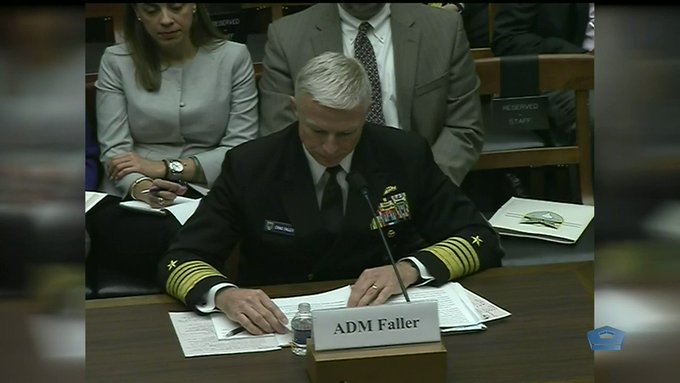
2,374
9:37 AM - Mar 11, 2020
Twitter Ads info and privacy
1,835 people are talking about this
This hearing was held before the US government took lockdown measures over the coronavirus pandemic. But many US military activities have continued despite the spread of the deadly Covid-19 virus — as have Washington’s suffocating sanctions imposed on Venezuela and Iran.
New cold war rhetoric demonizing China and Russia
The bellicose rhetoric Faller displayed in his verbal testimony and written statement submitted to Congress reflects the tone of Cold War aggression officially adopted by the US Department of Defense (DOD).
In 2018, the DOD published its first new national defense strategy in a decade. The historic document marked a shift from the US government’s so-called “war on terror” to a new military paradigm based on countering and containing China and Russia. In the words of former Defense Secretary James Mattis, “great power competition, not terrorism, is now the primary focus of U.S. national security.”
Faller’s congressional testimony reflected the new framework. The Southcom commander rattled off phrases like “the bad guys” when referring to the US government’s supposed enemies, and described China, Russia, Iran, Cuba, and Venezuela as “malign state actors” who are part of “a vicious circle of threats.”
Characterizing the Western hemisphere as “our hemisphere” and “our neighborhood,” Faller lamented that “Russia once again projected power in our neighborhood.” He added, “The ‘aha’ moment for me this past year is the extent to which China is aggressively pursuing their interests right here in our neighborhood.”
The goal is to “maintain the regional balance of power in favor of the United States,” Faller bluntly declared, advancing a clash of civilizations perspective in which China and Russia “don’t share our values.”
The Southcom commander’s testimony fixated on China, painting it as the supreme “threat.” Faller referred to China’s loans to countries in the region as “predatory financing,” and he claimed “the Chinese government absorbed three more Latin American countries into its One Belt One Road Initiative,” fear-mongering about Beijing’s attempt to build a new global territorial and maritime silk road.

U.S. Southern Command
✔@Southcom
During testimony before the #HASC, #SOUTHCOM’s Adm. Craig Faller discusses the importance of providing security support & investments for partner nations in #LatinAmerica & the #Caribbean and counter #China’s influence in the region.
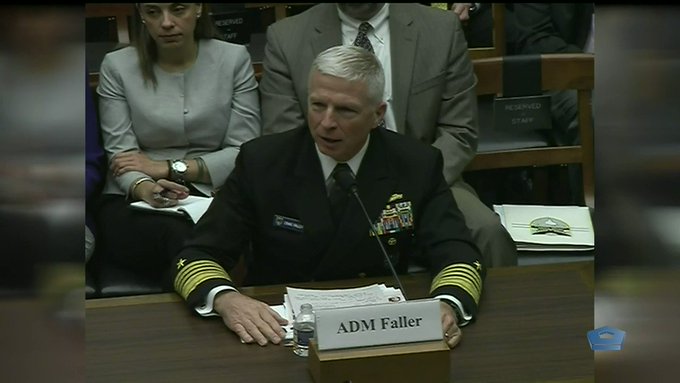
144
10:07 AM - Mar 11, 2020
Twitter Ads info and privacy
124 people are talking about this
As usual, the Kremlin was singled out as a global evildoer. “Russia continues to play the role of ‘spoiler,’ seeking to sow disunity and discredit the United States within our own hemisphere,” Faller said.
The Southcom commander heaped praise on right-wing US governments in Brazil, Ecuador, and Bolivia, where a military coup installed an unelected Christian nationalist regime. Faller was especially grateful that these governments “now recognize the Cuban threat to freedom, expelling thousands of Cuban officials.”
Echoing the line from Washington, Faller denigrated the democratically elected Sandinista government in Nicaragua as “authoritarian,” and referred to Venezuela’s elected government as “the former Maduro regime.”
Without offering any concrete evidence, Faller went on to claim the “final malign actors—Maduro and his cronies in Venezuela—pose one of the most direct threats to peace and security in the Western Hemisphere.”
Expanding military presence in Latin America
In his congressional testimony, Admiral Faller disclosed that there are “recurring rotations of small teams of Special Operations Forces, Soldiers, Sailors, Airmen, Marines, Coast Guardsmen, and National Guard personnel” in Latin America.
“There is no other region we depend upon more for our prosperity and security,” Faller said, “than Latin America and the Caribbean.”
The Southcom commander promised “major exercises to more directly support the global competition with the PRC and Russia.”
The National Guard has a State Partnership Program (SPP), he noted, in which it collaborates with the militaries of right-wing governments in the region.
The Southcom commander emphasized that Brazil is the newest member of the SPP. He added that the US military is “strengthening partnerships with” right-wing countries in the region, especially Brazil.
The Donald Trump administration has ramped up US interventionism in Latin America, overseeing a far-right military coup in Bolivia and backing coup attempts against the leftist governments of Venezuela and Nicaragua.
Against the backdrop of regime change operations, the United States Southern Command has announced a massive expansion of its military presence in the region.
Brazil will play an anchoring role in the new arrangement, embracing its new role as an extension of Pax Americana under the far-right government of Jair Bolsonaro. In recent months, Brazil has been designated a “major non-NATO ally” and signed a historic agreement incorporating its domestic defense industry into a Pentagon funding and research program.
In testimony before the House Armed Services Committee on March 11, the commander of US Southern Command, Admiral Craig S. Faller, announced, “There will be an increase in US military presence in the hemisphere later this year.”

U.S. Southern Command
✔@Southcom
#SOUTHCOM’s Adm. Faller: “There will be an increase in US military presence in the hemisphere later this year. This will include an enhanced presence of ships, aircraft, & security forces to reassure our partners… & counter a range of threats to include illicit narco-terrorism.”

2,374
9:37 AM - Mar 11, 2020
Twitter Ads info and privacy
1,835 people are talking about this
This hearing was held before the US government took lockdown measures over the coronavirus pandemic. But many US military activities have continued despite the spread of the deadly Covid-19 virus — as have Washington’s suffocating sanctions imposed on Venezuela and Iran.
New cold war rhetoric demonizing China and Russia
The bellicose rhetoric Faller displayed in his verbal testimony and written statement submitted to Congress reflects the tone of Cold War aggression officially adopted by the US Department of Defense (DOD).
In 2018, the DOD published its first new national defense strategy in a decade. The historic document marked a shift from the US government’s so-called “war on terror” to a new military paradigm based on countering and containing China and Russia. In the words of former Defense Secretary James Mattis, “great power competition, not terrorism, is now the primary focus of U.S. national security.”
Faller’s congressional testimony reflected the new framework. The Southcom commander rattled off phrases like “the bad guys” when referring to the US government’s supposed enemies, and described China, Russia, Iran, Cuba, and Venezuela as “malign state actors” who are part of “a vicious circle of threats.”
Characterizing the Western hemisphere as “our hemisphere” and “our neighborhood,” Faller lamented that “Russia once again projected power in our neighborhood.” He added, “The ‘aha’ moment for me this past year is the extent to which China is aggressively pursuing their interests right here in our neighborhood.”
The goal is to “maintain the regional balance of power in favor of the United States,” Faller bluntly declared, advancing a clash of civilizations perspective in which China and Russia “don’t share our values.”
The Southcom commander’s testimony fixated on China, painting it as the supreme “threat.” Faller referred to China’s loans to countries in the region as “predatory financing,” and he claimed “the Chinese government absorbed three more Latin American countries into its One Belt One Road Initiative,” fear-mongering about Beijing’s attempt to build a new global territorial and maritime silk road.

U.S. Southern Command
✔@Southcom
During testimony before the #HASC, #SOUTHCOM’s Adm. Craig Faller discusses the importance of providing security support & investments for partner nations in #LatinAmerica & the #Caribbean and counter #China’s influence in the region.

144
10:07 AM - Mar 11, 2020
Twitter Ads info and privacy
124 people are talking about this
As usual, the Kremlin was singled out as a global evildoer. “Russia continues to play the role of ‘spoiler,’ seeking to sow disunity and discredit the United States within our own hemisphere,” Faller said.
The Southcom commander heaped praise on right-wing US governments in Brazil, Ecuador, and Bolivia, where a military coup installed an unelected Christian nationalist regime. Faller was especially grateful that these governments “now recognize the Cuban threat to freedom, expelling thousands of Cuban officials.”
Echoing the line from Washington, Faller denigrated the democratically elected Sandinista government in Nicaragua as “authoritarian,” and referred to Venezuela’s elected government as “the former Maduro regime.”
Without offering any concrete evidence, Faller went on to claim the “final malign actors—Maduro and his cronies in Venezuela—pose one of the most direct threats to peace and security in the Western Hemisphere.”
Expanding military presence in Latin America
In his congressional testimony, Admiral Faller disclosed that there are “recurring rotations of small teams of Special Operations Forces, Soldiers, Sailors, Airmen, Marines, Coast Guardsmen, and National Guard personnel” in Latin America.
“There is no other region we depend upon more for our prosperity and security,” Faller said, “than Latin America and the Caribbean.”
The Southcom commander promised “major exercises to more directly support the global competition with the PRC and Russia.”
The National Guard has a State Partnership Program (SPP), he noted, in which it collaborates with the militaries of right-wing governments in the region.
The Southcom commander emphasized that Brazil is the newest member of the SPP. He added that the US military is “strengthening partnerships with” right-wing countries in the region, especially Brazil.

Brazil’s far-right President Jair Bolsonaro visited US Southern Command on March 8, 2020
US signs historic military agreement bringing Brazil into its imperial orbit
Craig Faller gave his congressional testimony just three days after hosting Brazil’s far-right President Jair Bolsonaro at US Southern Command.
Bolsonaro had traveled to Florida to meet with Donald Trump at his resort in Mar-a-Lago to discuss escalating their hybrid war on Venezuela.
The extreme-right Brazilian leader then toured the headquarters of Southcom, where he signed a major military agreement.
Southcom effused in a press release that “Bolsonaro’s historic visit marks the first time a Brazilian president has visited U.S Southern Command.”
Bolsonaro’s trip came just days after he endorsed a series of far-right, explicitly anti-democracy protests back in Brazil calling for the restoration of the military dictatorship.

U.S. Southern Command
✔@Southcom
During @jairbolsonaro visit to #SOUTHCOM today, the U.S. & Brazil signed a bilateral Agreement on Research Development, Test & Evaluation Projects that will expand opportunities to collaborate on new defense capabilities. @EmbaixadaEUA @DefesaGovBr @thejointstaff @USAemPortugues
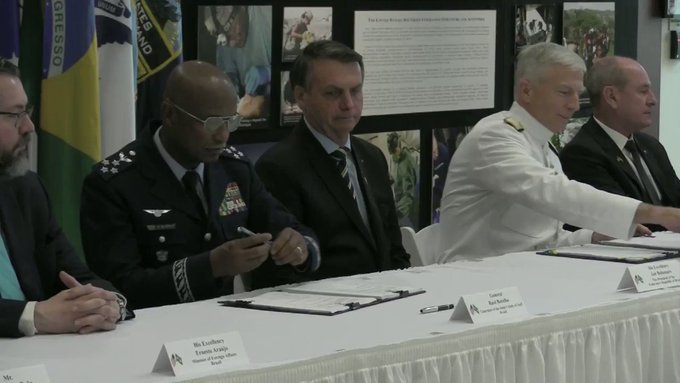
2,234
11:40 AM - Mar 8, 2020
Twitter Ads info and privacy
1,310 people are talking about this
Under the new agreement with the US, Brazil’s Ministry of Defense joined the Pentagon’s Research, Development, Test and Evaluation (RDT&E) funding system.
The deal followed Trump’s designation of Brazil as a “major non-NATO ally,” conferring special military status on the country.
The Brazilian daily, Folha de S.Paulo, described the treaty signed at Southcom as “an unprecedented military agreement that, if fully exploited, could help open the world’s largest defense market to the domestic industry.”
The RDT&E negotiations began in 2017 under the government of Michel Temer, an unelected right-wing leader who was installed after a parliamentary coup against the democratically elected left-leaning President Dilma Rousseff of the Workers’ Party.
The right-wing Argentine newspaper Clarín summarized the agreement with the following headline: “Brazil is incorporated into the US military-industrial complex.”
Clarín noted that the deal shows “Brazil has changed its international status and left the regional framework of South America,” essentially integrating itself into the US imperial system.
This is especially significant because Brazil is the largest country in Latin America, with the sixth-greatest population on Earth and the fifth-largest economy.
Clarín called the RDT&E deal “an inflection point in the history of Brazil and Latin America’s relations with the US.”
Bolsonaro’s administration has now proposed a free trade agreement with the US, the newspaper added, conditioned on the implementation of four neoliberal reforms: cutting the social security system, liberalizing protectionist measures, privatizing 140 state companies, and opening up the Brazilian economy to foreign capital.
“From this moment on, Brazil has become the United States’ main strategy ally in South America,” Clarín said.

U.S. Southern Command
✔@Southcom
Strengthening Partnerships: Photos from today's visit by #Brazil’s President @jairbolsonaro to #SOUTHCOM. Bolsonaro met w/ Adm. Craig Faller, & @DeptofDefense leaders to discuss the growing U.S.-Brazil defense partnership. @EmbaixadaEUA @DefesaGovBr @USAemPortugues
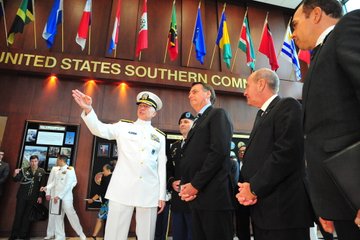
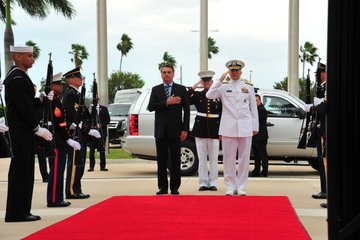
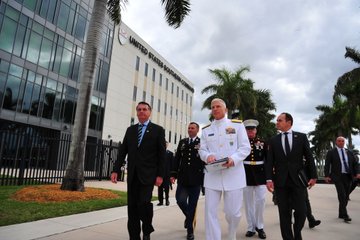

718
1:26 PM - Mar 8, 2020
Twitter Ads info and priva
cy
430 people are talking about this
Craig Faller gave his congressional testimony just three days after hosting Brazil’s far-right President Jair Bolsonaro at US Southern Command.
Bolsonaro had traveled to Florida to meet with Donald Trump at his resort in Mar-a-Lago to discuss escalating their hybrid war on Venezuela.
The extreme-right Brazilian leader then toured the headquarters of Southcom, where he signed a major military agreement.
Southcom effused in a press release that “Bolsonaro’s historic visit marks the first time a Brazilian president has visited U.S Southern Command.”
Bolsonaro’s trip came just days after he endorsed a series of far-right, explicitly anti-democracy protests back in Brazil calling for the restoration of the military dictatorship.

U.S. Southern Command
✔@Southcom
During @jairbolsonaro visit to #SOUTHCOM today, the U.S. & Brazil signed a bilateral Agreement on Research Development, Test & Evaluation Projects that will expand opportunities to collaborate on new defense capabilities. @EmbaixadaEUA @DefesaGovBr @thejointstaff @USAemPortugues

2,234
11:40 AM - Mar 8, 2020
Twitter Ads info and privacy
1,310 people are talking about this
Under the new agreement with the US, Brazil’s Ministry of Defense joined the Pentagon’s Research, Development, Test and Evaluation (RDT&E) funding system.
The deal followed Trump’s designation of Brazil as a “major non-NATO ally,” conferring special military status on the country.
The Brazilian daily, Folha de S.Paulo, described the treaty signed at Southcom as “an unprecedented military agreement that, if fully exploited, could help open the world’s largest defense market to the domestic industry.”
The RDT&E negotiations began in 2017 under the government of Michel Temer, an unelected right-wing leader who was installed after a parliamentary coup against the democratically elected left-leaning President Dilma Rousseff of the Workers’ Party.
The right-wing Argentine newspaper Clarín summarized the agreement with the following headline: “Brazil is incorporated into the US military-industrial complex.”
Clarín noted that the deal shows “Brazil has changed its international status and left the regional framework of South America,” essentially integrating itself into the US imperial system.
This is especially significant because Brazil is the largest country in Latin America, with the sixth-greatest population on Earth and the fifth-largest economy.
Clarín called the RDT&E deal “an inflection point in the history of Brazil and Latin America’s relations with the US.”
Bolsonaro’s administration has now proposed a free trade agreement with the US, the newspaper added, conditioned on the implementation of four neoliberal reforms: cutting the social security system, liberalizing protectionist measures, privatizing 140 state companies, and opening up the Brazilian economy to foreign capital.
“From this moment on, Brazil has become the United States’ main strategy ally in South America,” Clarín said.

U.S. Southern Command
✔@Southcom
Strengthening Partnerships: Photos from today's visit by #Brazil’s President @jairbolsonaro to #SOUTHCOM. Bolsonaro met w/ Adm. Craig Faller, & @DeptofDefense leaders to discuss the growing U.S.-Brazil defense partnership. @EmbaixadaEUA @DefesaGovBr @USAemPortugues




718
1:26 PM - Mar 8, 2020
Twitter Ads info and priva
cy
430 people are talking about this
No comments:
Post a Comment